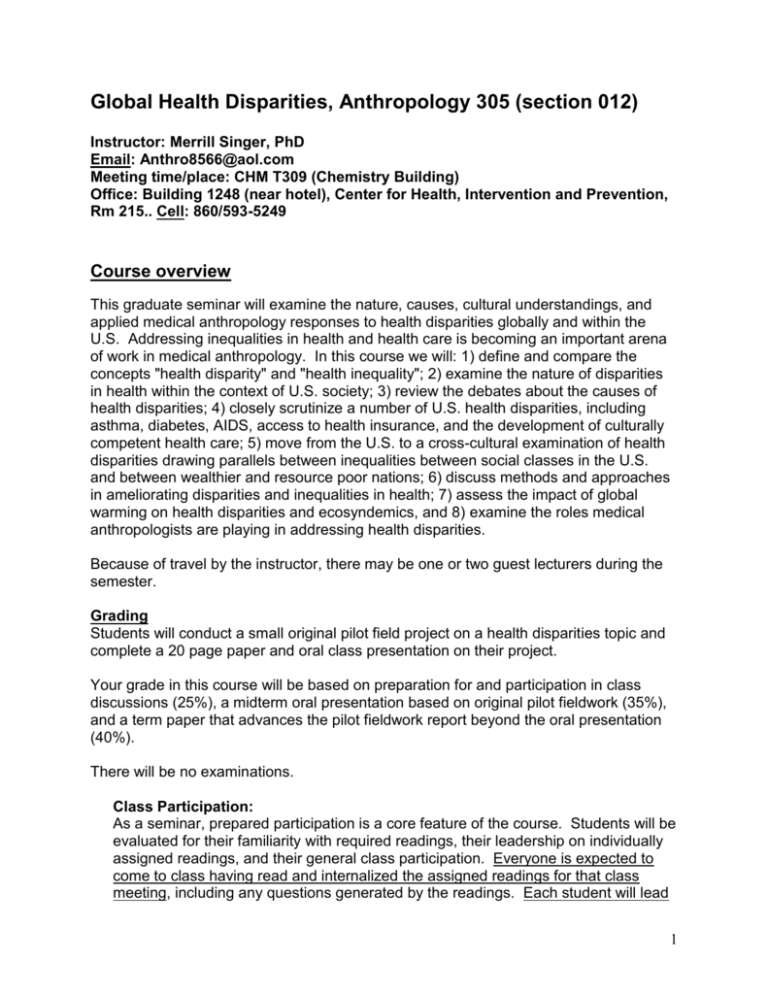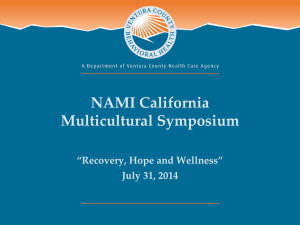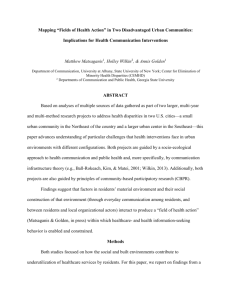Global Health Disparities - Society for Medical Anthropology
advertisement

Global Health Disparities, Anthropology 305 (section 012) Instructor: Merrill Singer, PhD Email: Anthro8566@aol.com Meeting time/place: CHM T309 (Chemistry Building) Office: Building 1248 (near hotel), Center for Health, Intervention and Prevention, Rm 215.. Cell: 860/593-5249 Course overview This graduate seminar will examine the nature, causes, cultural understandings, and applied medical anthropology responses to health disparities globally and within the U.S. Addressing inequalities in health and health care is becoming an important arena of work in medical anthropology. In this course we will: 1) define and compare the concepts "health disparity" and "health inequality"; 2) examine the nature of disparities in health within the context of U.S. society; 3) review the debates about the causes of health disparities; 4) closely scrutinize a number of U.S. health disparities, including asthma, diabetes, AIDS, access to health insurance, and the development of culturally competent health care; 5) move from the U.S. to a cross-cultural examination of health disparities drawing parallels between inequalities between social classes in the U.S. and between wealthier and resource poor nations; 6) discuss methods and approaches in ameliorating disparities and inequalities in health; 7) assess the impact of global warming on health disparities and ecosyndemics, and 8) examine the roles medical anthropologists are playing in addressing health disparities. Because of travel by the instructor, there may be one or two guest lecturers during the semester. Grading Students will conduct a small original pilot field project on a health disparities topic and complete a 20 page paper and oral class presentation on their project. Your grade in this course will be based on preparation for and participation in class discussions (25%), a midterm oral presentation based on original pilot fieldwork (35%), and a term paper that advances the pilot fieldwork report beyond the oral presentation (40%). There will be no examinations. Class Participation: As a seminar, prepared participation is a core feature of the course. Students will be evaluated for their familiarity with required readings, their leadership on individually assigned readings, and their general class participation. Everyone is expected to come to class having read and internalized the assigned readings for that class meeting, including any questions generated by the readings. Each student will lead 1 a class discussion (for which you may wish to make a handout of topics to be covered) during the course of the semester on a topic of their choice from the assigned topic list, but everyone is expect to have read the material and to participate in the discussion. Exorbitantly Oral Presentation: Each student will prepare 20 minute (plus time for questions & answers from instructor and other students) PowerPoint for oral presentation in class for mid-October based on the selection and initiation of a pilot field study on a health disparities project. Each student will select a topic in the first few weeks of class and discuss this individually with the instructor. The focus should be on original field work (using methods like mapping, interviews, observations, survey, pile sorts, consensus analysis, etc). It is understood that students in this course have busy life schedules and hence the scope of the project is limited and may be based on a topic that is “close to home” (e.g., stemming from other work, accessible populations, etc.). If students are already engaged in an ongoing study that is relevant to health disparities, this can be the focus of the presentation, but it must include new work initiated within the context of this course rather than represent something that was done prior to the course. The intention of this assignment and the final written report as well, is to provide the opportunity and input to assist you in moving towards or further along toward your dissertation and to conference presentation and publication. The oral presentation should follow the format and style of a professional conference presentation (and perhaps will become one, this should be kept in mind from the beginning) and clearly lay out the purpose of the study, methods, the target population(s), their social context, the topic of focus, and initial findings to the degree they are available. Term Paper: A final paper, 18-20 pages in length (typed, double spaced, spell checked) will be the basis for 40% of the course grade. Each student will extend the work presented in the oral report on a health disparity field project. The presentation should be in the style of a professional anthropological publication and, in that it should connect the study to the extant literature, should use the references cited style of the American Anthropologist. Papers are due on December 14th. Readings Books: 1. Social Injustice in Public Health, edited by Barry Levy and Victor Sidel, Oxford University Press, 2006. 2. Reproducing Inequities: Poverty and the Politics of Population in Haiti (Studies in Medical Anthropology) by M. Catherine Maternowska, 2006. 3. Diabetes among the Pima: Stories of Survival, by Carolyn Smith-Morris, 2006. 4. Pathologies of Power: Health, Human Rights, and the New War on the Poor, by Paul Farmer, 2004. 2 Articles and Book Chapters: Various PDFs, Microsoft Word files, and PowerPoint files are posted online for this class. Additional optional readings are also posted for those interest in particular topics. Course Schedule: Discussion Topics &Reading 1) Week of Aug 27 Course overview and mechanics, participation, scheduling Introductions: instructor and students Discussion of topical interests for presentations/papers What is health disparities? Medical Anthropology and health disparities 2) Week of Sep 3 Theorizing & Exploring Health Disparities Life Style vs. Structure Structural Violence Social justice and health: Conceptualizing Fairness Is health a human right? Urban desertification: A Health Policy of Health Disparity Biology of Poverty: History Under the Skin Readings: - Levy & Sidel Chapter 1 (book) - Farmer, Introduction, Chapter 1, 2 (book) - Farmer “An Anthropology of Structural Violence” PDF [Online 1] - Chaufan [Online 37] - (Optional: Health Disparities Online 27, 42, 43) 3) Week of Sep 10 U.S. Health Disparities Ethnicity & Class African American: A History of Unequal Health AIDS Readings: - Levy & Sidel Chapter 2, 3 (book) - African Americans and AIDS fact sheet, PDF [Online 2, 32] - Franks et al., PDF [Online 3] - Fact Sheet on Health among African American men, PDF [Online 4] 4) Week of Sep 17 U.S. Health Disparities Latinos Diabetes & Asthma Native Americans – Diabetes 3 Readings: - Diabetes among the Pima: Stories of Survival (book) - Latinos and AIDS fact sheet, PDF [Online 5] - Santelices et al., PDF [Online 6] - (Optional: Online 29, 31) 5) Week of Sept 24 Syndemics & Disease Load Readings: - Merrill Singer, Pamela Erickson, et al., PDF [Online 7] - Farmer, Chapter 7, 10 (book) - Romero-Daza et al., PDF [Online 8] 6) Week of Oct 1 Gendered Disparities Readings: - Levy & Sidel Chapter 4, 7 (book) - Farmer, Chapter 3 (book) - Villafuente et al, PDF [Online 9] 7) Week of Oct 8 STUDENT CLASS PRESENTATIONS & DISCUSSION 8) Week of Oct 15 Injustice in the Clinic Unequal Treatment Health Care Access, Health Insurance Readings: - Levy & Sidel Chapter 12 (book) - Patient Version, Unequal Treatment, PDF [Online 10] - Unequal Treatment, PDF [Online 11] - Unequal Treatment, PowerPoints 1 & 2 [Online 12 & 13] 4 9) Week of Oct 22 Health Communication & Care Health Literacy Culturally Appropriate Health Care Readings: - Health Literacy, Microsoft Word File [Online 14] - Health Literacy Slides, PDF [Online 15] - Literacy and Health in America, PDF [Online 16] - Juckett, PDF [Online 32] - (Optional: Literacy Online 17; Culturally Appropriate Care 36, 37, 38) 10) Week of Oct 29 Global Heath Disparities: Rich Nations, Poor Nations Readings: - Levy & Sidel Chapter 15, (book) - WHO Global Health, PDF [Online 18] - World Patterns of Mortality [Online 19] - Health in a World of Wealth and Poverty, PDF [Online 40] - (Optional: Online 28, 33, 34, 41) 11) Week of Nov 5 Case Study: Haiti Readings: - Haiti’s Development Needs [Online 20] - Reproducing Inequities: Poverty and the Politics of Population in Haiti [Online 35] - Farmer, Chapter 5, 6 (book) 12) Week of Nov 12 Disparities of Consumption Nutrition, Malnutrition, Food Insecurity, Starvation 5 Water Readings: - Himmelgreen et al., PDF [Online 21] - Food, Health, and Disease, PDF [Online 22] - Johnson, Commodification of Water, PDF [Online 23] - Whiteford, Casualties in the Globalization of Water, PDF. [Online 24] 13) Week of Nov 19 ~ Thanksgiving Break ~ (Contemplate global dietary disparities) 14) Week of Nov 26 Environment & Global warming: Impacts on Health Disparity Ecosyndemics Readings: - Levy & Sidel Chapter 18, 26 (book) - Singer & Baer, Chapter 4, 5, Microsoft Word [Online 25 & 26] 15) Week of Dec 3 Can There be a More Equitable Future?: Ameliorating Health Disparities Readings: - Levy & Sidel Chapter 22, 23, 24 (book) 6 December 14th Term Papers Due Grades submitted, December 18th 7 Books 1) Social Injustice in Public Health, edited by Barry Levy and Victor Sidel, Oxford University Press; ISBN: 13-978-0-19-517185-3; 529 pages, year: 2006 2) Reproducing Inequities: Poverty And the Politics of Population in Haiti (Studies in Medical Anthropology) by M. Catherine Maternowska, 2006) Paperback: 221 pages Publisher: Rutgers University Press (September 30, 2006) Language: English ISBN-10: 0813538548 ISBN-13: 978-0813538549 3) Diabetes Among the Pima: Stories of Survival By Carolyn Smith-morris Hardcover: 210 pages Publisher: University of Arizona Press (October 30, 2006) Language: English ISBN-10: 0816525536 ISBN-13: 978-0816525539 Pathologies of Power: Health, Human Rights, and the New War on the Poor 4) By Paul Farmer Paperback: 402 pages Publisher: University of California Press; 1 edition (November 22, 2004) Language: English ISBN-10: 0520243269 ISBN-13: 978-0520243262 8








